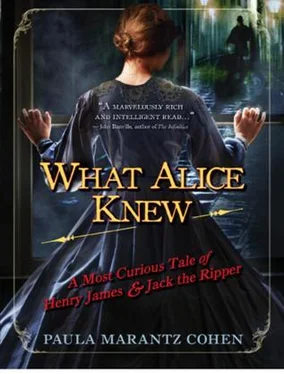“Do you miss your mother and father?” asked Alice.
“Can’ say I miss what I never ’ad,” said the boy. “Not as I blame ’em, havin’ all the troubles they did; they coulden very well think on me. I kep’ track of ’em, though, ’specially my mum.” The boy’s face grew dark, and Alice suspected that he might blame himself for her death.
“What do you mean you kept track?”
“I were always good at followin’ people, without them knowing, that is. So I used to follow my mum when she went places. Not as she went out much, ’specially toward the end. But that day she did, an’ I followed ’er. She went to the church and lit a candle for me brother as died, and stayed there for a long time. It was the las’ thing she did afore she done away wi’ ’erself. I used to follow my dad too. Mostly ’e went to those places where they lie around with pipes lookin’ like they’re dead.”
“Opium dens,” said Alice matter-of-factly. “I’m told they can ease pain and misery, but at the cost of deadening the mind. You must never do that, Archie. We must bear whatever pain we have and keep our minds sharp.”
“And why’s that, mum?”
“Because our minds are the one thing we have that is truly ours—that no one can take from us. To be able to think is a rare and precious thing, to be protected, no matter what happens to us.”
“I can see that, mum.”
“So you’ve gotten along without parents,” said Alice. “You’re a strong boy.”
“It’s not as I diden wanna have ’em,” said the boy. “I saw other chaps whose mums worried ’bout whether they ’ad a hole in their trousers or a button gone. I used to say, ‘My mum’s gonna whup me for losing that there button,’ jus’ so it would look like someone cared as I lost it. But no one did.”
“Well, we care here,” said Alice. “And if you lose any buttons, you will have me to answer to. I hope you can begin to feel at home with us.”
“I do, mum. I feel I got a home now more swell than any a the rest of ’em. Sally, she’s like a sister, only stric’ like a mum. I likes it when she yells at me, which is jus’ as well, as she yells at me a lot.”
“Well, that’s good to hear,” said Alice, feeling that she ought to have the boy leave the room before she burst into tears. “Tell Sally that she is to continue to yell. And now, I think, I’ll rest a bit. Please close the door quietly when you leave.”
After he had gone, Alice took Sargent’s parcel from the bed table, where she had placed it. Under the brown wrapping, the painting had been wrapped in newspaper. She carefully spread the paper out on the bed to reveal the picture. Sargent’s masterful rendering of the woman in the red cloak shimmered with new luster under the application of a fresh coat of varnish. She let her gaze rest on the painting for a few minutes, and then her attention wandered to the newspaper on which it lay. Her glance stopped with a jolt. “Of course,” she muttered excitedly to herself, her eyes fastened on the page. “Of course. I understand now!”
Two hours later, when the brothers arrived at Alice’s apartment in response to her message to come at once, they found her in bed nibbling on a brioche. Her eyes were very bright.
“You’re in time for tea—or rather coffee, since that’s what we’re having this afternoon. And you must try one of these,” she said, motioning to the basket of brioches next to a dish of fresh butter and a jar of preserves. “They’re as light as air, thanks to a recipe that Katherine got from Fanny Kemble, and that Fanny got from the divine Sarah Bernhardt. It’s a brioche with a dramatic genealogy.”
The brothers sat down at the little corner table and began eating the brioches and sipping the Moroccan coffee that Sally poured into the large mugs that had been given to Alice by her friend, Mrs. Humphrey Ward. Mrs. Ward had an idolatrous admiration for the late Dickens, and the mugs, which she liked to give as gifts, were painted with characters from Dickens’s novels. Henry found the whole thing very gauche (though perhaps he was jealous). He had at first refused to drink from a mug until Alice said that if he didn’t, it would make more work for Sally, at which he relented and took the one with the picture of Mr. Micawber on it.
They drank their coffee, while Alice kept silent as Henry maligned the mugs and William noted that strawberry preserves were better in America. Suddenly she burst out, unable to contain herself any longer. “I called you here on such short notice because I have an idea about the murders.”
The brothers looked at each other.
“We await illumination,” said William.
“We are all ears,” said Henry.
Alice ignored their facetious tone and continued excitedly, “It began with certain observations that I made while studying the letters. I examined them closely after that horrible Lancaster woman left and was struck, first, by the handwriting. We’ve already discussed the misspellings as exhibiting what William called ‘disingenuous illiteracy.’ The handwriting appears to show a similar tendency; it is artificially awkward.”
“Yes,” said William impatiently. “As I said, it’s clearly the work of someone trying to disguise his hand.”
“But it’s more than that!” exclaimed Alice. “It’s not the sort of handwriting in which the writer is simply trying to deceive. It suggests someone accustomed to using the pen in unorthodox and original ways. The writing is more graphic than it is orthographic, if you follow me.”
“Not really,” said Henry.
“Let me clarify, then, with something I discovered this afternoon. Look at that.” She pointed across the room, where Sargent’s painting had been hung back on the wall.
“One of John’s Venetian scenes,” noted William.
“Not among his best,” said Henry.
Alice ignored them and proceeded. “John took that painting home the other day because he said it looked dull and he wanted to revarnish it. When he sent it back, it was wrapped in newspaper. Some of the varnish dripped onto the paper. Look here.” She took a piece of newspaper from the bed table and indicated a few small shiny spots on the surface. “I sent Katherine to the Sargents’ to inquire about it. The substance is called megilp, a mixture of linseed oil and turpentine commonly used to varnish paintings. Now,” she said, taking one of the Ripper letters from her bed table with a flourish, “look at this!” She pointed to the spot on the page that they had noted before.
“They resemble each other,” acknowledged Henry.
“It’s a shiny, clear substance,” said William peevishly. “It could be anything.”
“I’ve had Katherine purchase a variety of gluing materials. Nothing except megilp dries this way. So the question is this: why would our writer have reason to employ megilp? This brings me to another observation. The reddish smudge on the other letter that you said yourself did not resemble dried blood. It does, however, resemble dried paint.” She took out a sheet of paper, on which there were multiple splotches in a variety of reddish hues. “While Katherine was at John’s, I asked her to have him put together a sample of some of his reds, which he did with his usual thoroughness. Kindly take a look. This one on the right, which John has marked ‘dark amber,’ is an excellent match. I will have to show him the smudge for verification, but it seems to me reasonable to assume that the smudge on the letter is paint.”
“Let me see that,” said William, grabbing the sample sheet. He had fleetingly considered that the smudge on the Ripper letter might be paint when he first saw it. He knew what dried paint looked like; he had been a painter, but he had instinctively pushed the idea out of his head because he had no wish to recall that period of his life. He knew the mind could work that way. Elements relating to one thing could slip, without one’s awareness, into affecting another.
Читать дальше












